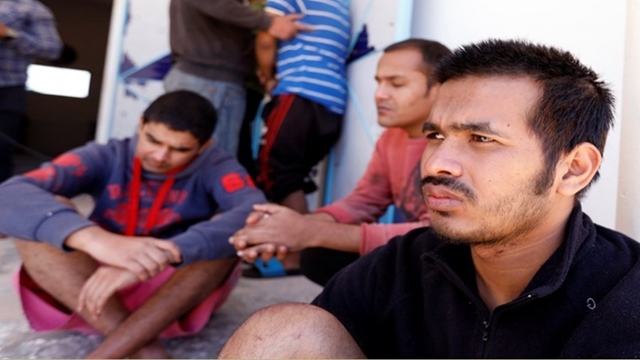FT Online
Published:2019-05-16 21:15:34 BdST
Migrants take perilous voyage as employment at home scarce
Limited employment opportunities at home are forcing Bangladeshi fortune-seekers to opt for risky migration to the European Union countries, experts said.
They said a large number of youths remain jobless who cannot do business or other work at home, which prompts them to embark on a perilous sea journey to realise their dream.
About 45 Bangladeshis remained missing since Thursday when a boat capsized in the Mediterranean Sea as they attempted to reach Europe from Libya.
Tunisian Navy and fishermen on Saturday rescued 16 survivors. Of them, 14 were Bangladeshis.
Of 60 migrants, some 37 who perished in the incident were Bangladeshis, according to media reports.
Syed Saiful Haque, chairman of the WARBE Development Foundation, said about 2.7 million youths enter the job market each year.
But the majority of them find no work at home to make a better living, he said, adding this situation forces them to choose risky journey, though they are aware of the uncertainty.
"Without giving bribe, none gets a government job," Mr Haque said.
When an educated man feels that he will not get a good job spending even Tk 0.7 to 0.8 million, then he decides to move to a developed country to make their dream come true.
There exists no good environment for doing small business and if people invest, they are forced to give extortion to politically influential people, he said.
Mr Haque suggested taking a joint initiative with transit countries to prevent such irregular action.
Only Bangladesh will not be able to resolve this crisis, he said. "How are the migrants crossing the borders?" he asked.
Countries should take immediate measures in light of the 'Global Compact on Migration' whose objectives and actions are to address safe movement of people.
A study conducted by Ovibashi Karmi Unnayan Programme (OKUP) last year showed about 81 per cent Bangladeshi workers were forced to migrate to Italy from Libya as they were jobless in the war-torn country.
Some 16 per cent had been deliberately brought from Bangladesh to countries like Sudan, Egypt and then sent to the Italian maritime territory via the Libyan coast.
Of the surveyed workers, some 79.3 per cent knew they could die in the sea. But they boarded the boat towards Italy with an expectation to better their lives and those families back home.
In contrast, 90.2 per cent of the families were aware about the risks associated with such type of journey.
The research finds that a majority-or 66 per cent--of Bangladeshi migrants are aged between 18 and 30 years while 19 per cent are minors--below 18. OKUP chairman Shakirul Islam said human trafficking via Libya to Europe has been continuing since 2011 and this crime ebbs after crackdown.
But after some days they start again changing the routes, he said.
Taking the advantage of poor background, organised traffickers are active in remote corners of Bangladesh to allure villagers with non-existent jobs in Europe.
He said since traffickers are not punished, this crime is not coming down.
"Why does the government allow sending workers to Sudan as the African country has no job opportunities?' he questioned. He said it is not only a national issue but a global matter.
So this problem should be resolved globally, he added.
Some 100,000 Bangladeshis were estimated to have reached the EU between 2010 and 2017.
Unauthorized use or reproduction of The Finance Today content for commercial purposes is strictly prohibited.


